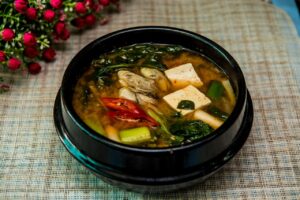Doenjang-Jjigae, a staple in Korean cuisine, is a robust and savory stew made from fermented soybean paste known as doenjang. This dish, beloved for its rich umami flavor and health benefits, is a perfect introduction to vegan Korean food. In this blog, we’ll explore what makes Doenjang-Jjigae special, its nutritional benefits, the best seasons to enjoy it, and provide you with two delicious vegan recipes. We’ll also cover storage tips and complementary foods to enhance your Doenjang-Jjigae experience.

What is Doenjang-Jjigae?
Doenjang-Jjigae is a traditional Korean stew primarily made with doenjang, a fermented soybean paste. This paste forms the heart of the dish, providing a deep, savory flavor. Typically, the stew includes a variety of vegetables, tofu, and sometimes seafood or meat. However, for a vegan twist, we’ll focus on plant-based ingredients. The versatility and depth of flavor make Doenjang-Jjigae a beloved comfort food in Korea.
Nutritional Benefits of Doenjang-Jjigae
Doenjang-Jjigae is not only delicious but also packed with nutritional benefits:
- Rich in Probiotics: The fermentation process of doenjang produces probiotics, beneficial for gut health.
- High in Protein: Soybeans are a great source of plant-based protein.
- Low in Calories: Despite its hearty flavor, Doenjang-Jjigae is relatively low in calories.
- Vitamins and Minerals: The stew is rich in vitamins (B12, B6) and minerals (iron, calcium) from the various vegetables and tofu.
Best Seasons to Enjoy Doenjang-Jjigae
Doenjang-Jjigae can be enjoyed year-round, but it is particularly comforting during the colder months. Its warm, hearty nature makes it a perfect winter dish. However, with seasonal vegetables, it can be adapted for any time of the year. For instance, adding fresh zucchini and tomatoes in summer or root vegetables like radishes and sweet potatoes in winter enhances its seasonal appeal.

Recipe 1: Classic Vegan Doenjang-Jjigae
Ingredients (for 2 servings)
- 2 cups water
- 2 tbsp doenjang (fermented soybean paste)
- 1 cup tofu, diced
- 1/2 cup zucchini, sliced
- 1/2 cup potato, diced
- 1/2 cup onion, sliced
- 1/2 cup mushrooms, sliced
- 2 cloves garlic, minced
- 1 tbsp gochugaru (Korean red pepper flakes) – optional
- 1 tsp soy sauce
- 1 tsp sesame oil
- 1 green onion, chopped
Instructions
- Prepare the Broth:
In a medium pot, bring 2 cups of water to a boil. Add the doenjang and stir until it dissolves completely. - Add Vegetables:
Add the diced potato, sliced onion, and minced garlic to the pot. Let it simmer for about 10 minutes until the potatoes start to soften. - Incorporate Tofu and Zucchini:
Add the tofu, zucchini, and mushrooms. Continue to simmer for another 10-15 minutes until all the vegetables are tender. - Season the Stew:
Stir in the gochugaru (if using), soy sauce, and sesame oil. Adjust the seasoning to taste. - Garnish and Serve:
Garnish with chopped green onions and serve hot with a side of steamed rice.
Recipe 2: Spicy Vegan Doenjang-Jjigae with Kimchi
Ingredients (for 2 servings)
- 2 cups vegetable broth
2 tbsp doenjang
1 cup firm tofu, diced
1/2 cup kimchi, chopped
1/2 cup spinach
1/2 cup carrots, sliced
1/2 cup mushrooms, sliced
2 cloves garlic, minced
1 tbsp gochujang (Korean red chili paste)
1 tsp soy sauce
1 tsp sesame oil
1 green onion, chopped
Instructions
- Prepare the Broth:
In a medium pot, bring the vegetable broth to a boil. Add the doenjang and stir until dissolved. - Add Base Ingredients:
Add the garlic, carrots, and mushrooms to the pot. Simmer for about 10 minutes. - Incorporate Tofu and Kimchi:
Add the tofu and kimchi. Continue to simmer for another 10 minutes. - Add Spinach and Seasoning:
Stir in the spinach, gochujang, soy sauce, and sesame oil. Cook for an additional 5 minutes until the spinach is wilted and the flavors are well combined. - Garnish and Serve:
Garnish with chopped green onions and serve hot with a bowl of steamed rice.
Storage Methods for Doenjang-Jjigae
Proper storage is crucial to maintain the flavor and freshness of your Doenjang-Jjigae. Here are some tips:
- Refrigeration: Store leftover Doenjang-Jjigae in an airtight container in the refrigerator. It can last for up to 3-4 days. Reheat it on the stove or microwave before serving.
- Freezing: For longer storage, you can freeze Doenjang-Jjigae. Portion it into freezer-safe containers and freeze for up to 2 months. Thaw it in the refrigerator overnight before reheating.
Complementary Foods
Doenjang-Jjigae is typically served with steamed rice, but there are other side dishes that pair well with it:
- Kimchi: This fermented cabbage dish adds a spicy, tangy contrast to the savory stew.
- Namul (Seasoned Vegetables): A variety of seasoned vegetable dishes, such as spinach or bean sprouts, complement the flavors of the stew.
- Japchae: Korean stir-fried glass noodles can add a different texture and flavor to your meal.
- Pickled Radishes: These provide a refreshing crunch and acidity that balance the rich flavors of Doenjang-Jjigae.
Conclusion
Doenjang-Jjigae is a nutritious and versatile dish that fits well into a vegan diet. With its deep umami flavors and numerous health benefits, it’s no wonder this stew is a favorite in Korean households. By following the recipes and tips provided, you can enjoy this hearty dish year-round. Pair it with traditional Korean side dishes for a complete and satisfying meal.
Whether you are new to Korean cuisine or a seasoned enthusiast, Doenjang-Jjigae is a delightful dish to include in your recipe repertoire. Happy cooking and enjoy your healthy, vegan Doenjang-Jjigae!
